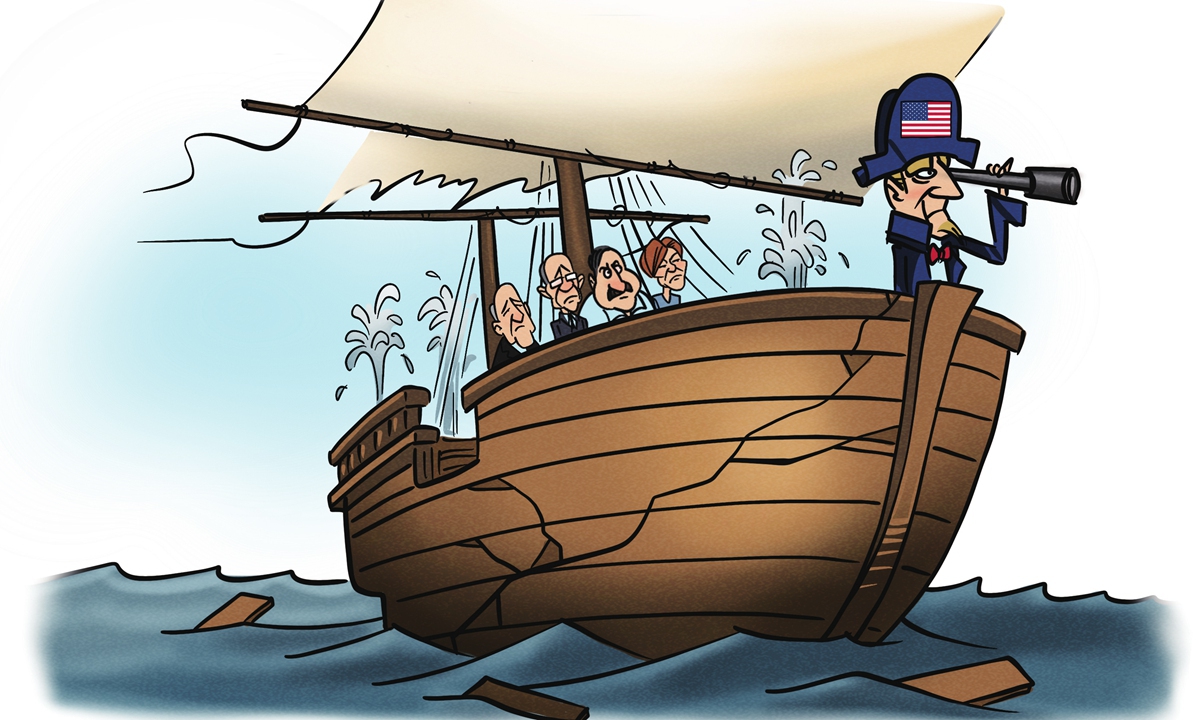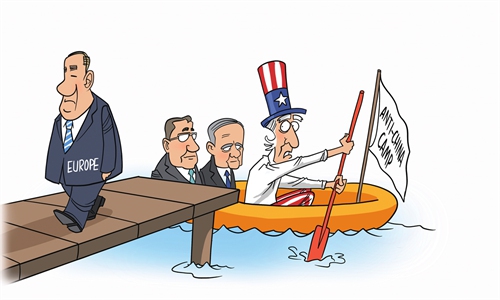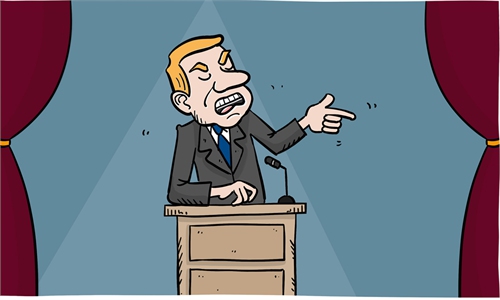
Illustration: Liu Rui/GT
The US and its major allies continue to stoke controversy in areas such as human rights. Recently, Washington attempted to force the World Health Organization to conduct a politics-driven virus origins probe as a focus to attack China, and the main supporters of this action are still its allies. The circle the US has built is centered around countries including the US, Europe, Australia, and Japan. They are often referred to as "the West." But lately, the Chinese have been using a new term: "The US and the West."The total population of the US and the West is a little over 1 billion, or about one-eighth of the whole human population. But these countries play a leading role in world affairs. Their GDP accounts for more than half of global GDP. Their discourse power is overwhelmingly dominant. Thus, they have a monopoly on how controversial issues are interpreted and defined.
The US is desperate to turn its conflict with China into a collision between the West and China, and the Biden administration in particular has done everything possible to achieve this goal. China should try to distinguish the China-US conflict from friction between China and the West. It should prove to the world that these things are strategically different. In this way, China can make it more difficult for the US to turn the whole Western camp against China.
It is worth mentioning that the US has some natural advantages in pulling the Western camp to pressure China. First, the West is a de facto alliance based on ideology and values. In addition, in an era of great global changes, these countries have a certain sense of common interests that overrides their differences. The US is taking advantage of these conditions. It is trying to use the ideological conflict as a grip to make its conflict with China a struggle between China and the West. This has fooled many Westerners.
However, the Achilles' heel of this US strategy is that the confrontation between China and the West that the US has been promoting goes against globalization - the trend of the times. And this confrontation requires Western countries to pay the price by sacrificing their own development opportunities and a wealth of actual benefits. However, China and the West are not in a zero-sum relationship. The US not only goes against the facts, but also runs counter to the development interests of these Western countries.
This gives China an important opportunity to break the united front between the US and the West. Through a series of efforts, it is entirely possible for China to substantially weaken the consensus between the US and the West on China. It can also turn a large part of conflicts which the US intends to create between China and the West into those between the US and other Western countries, resulting in a struggle between coercion and anti-coercion.
In order to achieve this, China should first adopt different policies toward the US and its allies, while at the same time treat members of the Five Eyes alliance and other Western countries differently. Previously, China attached more importance to maintaining China-US relations. In the future, we will devote more of our resources to European countries and bring about a change in direction of diplomatic strategy.
We need to try to play down the so-called China-West frictions and talk more about the China-US conflict. The flashpoint of the so-called China-West conflict lies in ideological frictions in areas such as human rights disputes. China can engage in more communication with Western countries from the perspective of cultural diversity, advocate the notion of harmony without uniformity, and try to reduce the number of specific friction points. We should not lose confidence due to the many frictions in this field. In fact, there is a great deal of room to work on, and it is worth exploring.
Constantly expanding the scale of economic cooperation between China and the West is the key. In the past, the US was the priority when it came to cooperation. In the future, more attention should be paid to upgrading collaboration with Western countries other than the US. It is very feasible that general ideological conflicts will not stop European countries, such as Germany and France, from continuing their cooperation with China, because the interests of those European countries in China are simply too great. We must keep increasing the attractiveness of the Chinese market to Western countries, and must not let it stagnate or shrink.
China needs to strengthen its ties with developing countries and continuously increase its bargaining chips in dealing with the West. As China's national strength rises, the country's ability to do so will also increase. China should unite Russia and the vast number of developing countries to find appropriate opportunities and agendas to puncture US arrogance. By doing so, it can make most Western countries realize that the US is not all-powerful and ever-victorious, and weaken the US' attractiveness and coercive power to the West.
For example, at the United Nations Human Rights Council, China and other developing countries have crushed anti-China bills proposed by the US and the West multiple times. In the future, we should try to take the initiative to teach the US a lesson, dealing it a head-on blow in the field of human rights. This is entirely possible, as there are so many human rights loopholes in the US.
In conclusion, the US and the West do not represent the international community, and the US is not supposed to have the ability to build a "Western camp" against China. After years of efforts, it will be possible for China to tear down the wall called "the West" that the US has built specifically against China.


